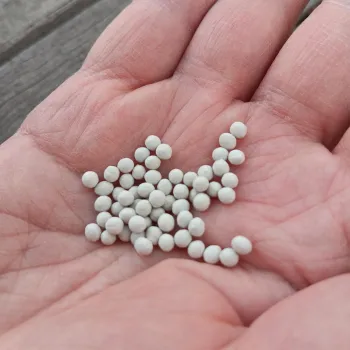by Alison Collin
Inyo-Mono Master Gardener Volunteer
One of the most tedious gardening jobs at this time of year must surely be thinning seedling crops such as carrots and beetroot. If you have ever done this you must have experienced the dilemma of having a cluster of beautiful young plants that have to be thinned down to only one in order for it to have space to develop, while on either side of it there is a gap where no plants have germinated and those spaces could easily accommodate three or four plants each. Added to that is the fact that it is a hands-and-knees job which for many of us is not the most comfortable way to spend an afternoon.
I was delighted when I saw a seed catalog offering some of my favorite vegetable seeds in a “pelleted” version. These are individual seeds that are coated with a bead of fine clay which is usually white. This makes the seed much easier to handle and see if it is small, so when planting it is a simple matter to drop a pellet into the seed drill at regular intervals. It is a bit like planting magic pills, and virtually eliminates the time-consuming chore of thinning.

In my experience pelleted seeds take a little longer to germinate than regular seeds, but the carrots came up evenly, and the beets in general came up as individual plants rather than clusters which is the usual way for them to germinate because each beet seed is, in fact, a conglomeration of three or four seeds.
However, in spite of this modern wonder, my hands-and-knees activity has not been reduced this year because the sieved home-made compost that I used to cover the seeds at planting had not reached a sufficient temperature to kill weed seeds, so although the carrots are through, so are masses of very healthy, tiny weeds.
If only there was a “magic pill” to get rid of those!
Things You Should Know
Pelletizing seeds has some minor effects on seed germination, some positive, some negative. Some factors to consider are listed in the table below.
| Not chemically treated: | They don't contain substances such as fungicides, and are therefore safe and easy for children to handle. | |
| Conserves moisture: | Seeds do not dry out as quickly and are less likely to wash away in heavy downpours. | |
| Reduced waste: | Pelleted seeds result in more even sowing, especially with mechanical planters. Some seeds such as petunias are very hard to plant without pelleted seeds. | |
| Shorter shelf life: | It's advised to plant them fresh. If storing, keep in an airtight jar in a cool, dark place. | |
| Germination time: | Germination can take a little longer with some species. | |
| Cost: | Pelleted seeds are usually more expensive, but can reduce the need for thinning later. |

